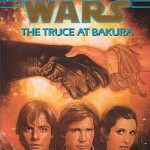Each Wednesday in What Memes Mean, Kirk Bozeman questions the significance, humor, and subtexts of viral videos, memes, and other Internet fads.
George Takei (best known as Sulu of the original Star Trek series) has issued a statement to the warring tribes of Trekkies and Star Wars nerds. (The clip should undoubtedly have a PG rating, so FYI if you want to watch.) In this newly viral video, he calls for a cease-fire, saying “each [series] is wonderful in its own special way.” Takei hopes to broker peace, for “there is an ominous, mutual threat to all science fiction.” And what is this ominous threat? “It’s called Twilight; and it’s really, really, bad.”
Ha. Well played, Takei. Well played.
Yes, it’s fun to joke about Star Wars and Star Trek, and it’s even more fun to harp on current teenie-bopper fads. But amidst his jocular sci-fi antics, Takei’s assault on Twilight includes some incredibly poignant commentary on the purpose of fantasy (and story in general):
Gone is any sense of heroism, camaraderie, or epic battle. In its place we have vampires that sparkle and mope and go to high school… sci-fi fans be warned: there are no great stories, characters, or profound life lessons to be had in Twilight… in Twilight, the only message that rings through loud and clear is, “Does my boyfriend like me?”
The quartet of novels that compose the Twilight series are usually found tucked into displays in the “teen romance” section of Barnes & Noble, so I’d hate to give it too much literary credit. But Takei’s words are still very relevant — Twilight and friends are the kind of stories our culture is currently both creating and choosing to hear.
Star Wars is the modern epic that wow-ed us as 8-year-olds and pulled us into our first grand “good vs. evil” tale. Star Trek is a little further back for most, but at its heart is a tale of true, mature friendship among peers willing to lay their lives down for each another. Sci-fi fan or not, these are darn good stories that in their best moments teach meaningful metaphysical concepts.
But the “love” stories of Twilight and its gothy spinoffs are shallow and small, not selfless and grand: everlasting love that requires no work on either partner’s part, idealized mates and the glorification of self-centeredness in relationship, the “all’s fair in love and war” mentality. These are all things I as a teenager did not need to hear more about. This stuff is not epic or meaningful, and these characters are not ones we ought to emulate. It’s escape in the most banal sense of the term.
C. S. Lewis said this of fantasy:
At all ages, if [fantasy and myth] is used well by the author and meets the right reader, it has the same power: to generalize while remaining concrete, to present in palpable form not concepts or even experiences but whole classes of experience, and to throw off irrelevancies. But at its best it can do more; it can give us experiences we have never had and thus, instead of “commenting on life,” can add to it.
Lewis saw — like Takei sees — in fantasy an opportunity to teach, to set grand ideas in unforgettable settings. Fantasy should offer us escape to a place where the return leaves us better off than when we left, not a few steps behind from where we started.
I’m with Lewis and Takei on this one: Choose (and create) your fiction wisely. Join with the Trekkies and Nerf Herders, and demand that your fantasy be meaningful and worth re-telling to the next generation.











